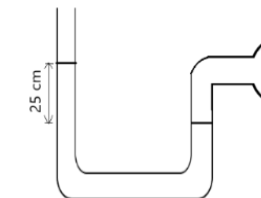
Physics Questions and Answers
If you want to learn more about the nature and properties of matter and energy or you're simply preparing for a Physics exam, these Physics past questions and answers are ideal for you.

If you want to learn more about the nature and properties of matter and energy or you're simply preparing for a Physics exam, these Physics past questions and answers are ideal for you.
The sensitivity of a thermometer is
All of the above
how quickly a temperature change can be detected
the difference between the maximum and the minimum temperature
the smallest temperature change that can be detected or measured
Correct answer is D
The sensitivity of a thermometer is defined as the smallest temperature change that can be detected or measured, NOT how quickly that temperature change can be detected.
In contrast, the difference between the maximum and the minimum temperature is the range of a thermometer
108,986 Pa
165,238 Pa
122,364 Pa
134,645 Pa
Correct answer is D

density (ρ) = 13600 \(kgm^{-3}\); g =\(9.8 ms^{-2}\)
\(P_{atm}\) =101,325 Pa; ρ=13600 \(kgm^{-3}\)
Pabs=\(P_{atm}\)+ρgh
⇒Pabs=101,325+13600 x 9.8 x 0.25
⇒Pabs=101,325+33320
⇒ Pabs=134,645Pa
\(29.36^o\)
\(25.37^o\)
\(37.21^o\)
\(34.75^o\)
Correct answer is D
\(n_1\)=1.33; \(n_2\)=1.5; i=40°; r= ?
from snell's law:
\(n_1\) x sin i=\(n_2\)x sin r
⇒1.33 x sin 40°=1.5 x sin r
⇒sin r = 0.5700
⇒r = \(sin^{-1}\) (0.5700)
⇒ r = 34.75
7.2 kJ
4.6 kJ
6.8 kJ
8.4 kJ
Correct answer is A
The work done against the gravitational force is calculated using the formula W = mgh, where m is the mass of the object, g is the acceleration due to gravity (approximately \(9.8 ms^2\) on Earth), and h is the height. Substituting the given values, we get W = 3.0 kg * \(9.8 m/s^2\) * 240 m = 7.2 kJ. Therefore, the correct answer is '7.2 kJ'.
47 g
52.8 g
37.6 g
56.6 g
Correct answer is D
Let mb=mass of empty bottle,
\(m_w\)=mass of water only and
\(m_a\)= mass of alcohol only
given; \(m_b\)=19g
\(m_b\) + \(m_w\) = 66g
\(m_b\) + \(m_a\) = ?
R.d=0.8
R.d=mass of alcohol
⇒\(\frac{mass of alcohol}{mass of equal volume of water}\)
⇒ mass of equal volume of water = \(m_w\)=66-19=47g
⇒0.8 = \(\frac{m_a}{47}\)
⇒\(m_a\)=0.8×47 =37.6g
; \(m_b\) + \(m_a\) = 19+37.6=56.6g